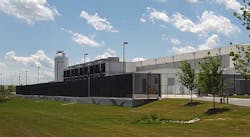Bigger is better when it comes to buying electricity. This is providing an opportunity for major data center developers, who are building larger cloud campuses and buying up other providers. As their data center networks grow, these companies are finding opportunities to slash their power bill, reducing one of their biggest costs.
One example is Digital Realty, which said this week that it is able to procure discounts from utilities by combining the power purchases for multiple data center campuses within a market. In the Chicago market, the company was able to consolidate its energy purchasing for its existing campuses with the suburban Chicago properties operated by DuPont Fabros Technologies, which Digital Realty acquired last year.
The acquisition of DuPont Fabros, along with the opening of new data center campuses in 2017, resulted in a 60 percent increase in Digital Realty’s power footprint in just a single year, according to Erich Sanchack, Executive Vice President of Operations at Digital Realty.
“We’ve gotten to a size that defines us as a preferred customer for utilities,” said Sanchack. “When we bundle these campuses together, we can drive down power pricing. We pass the savings directly along to our customers, significantly lowering their total cost of ownership.”
That’s what has happened in Chicago, where Digital Realty says its energy consolidation allowed it to lock in rates through 2022 that are more than 20 percent below the current market rate. The company operates more than 155 megawatts of data center capacity across its four campuses in Greater Chicago.
Not Just for Hyperscalers Anymore
Combining campuses allows multi-tenant operators like Digital Realty to approach the size of major hyperscale providers, who have been the most active players in negotiating bulk deals with utilities for their data center power. While hyperscalers have focused their bulk purchasing on renewable energy, Digital Realty says its sees an opportunity to combine its scale, investment grade credit rating, and in-house expertise in energy provisioning to create a broader set of business benefits.
“Our market presence and platform represent significant advantages when negotiating on customers’ behalf, driving economic efficiencies we are pleased to secure for their benefit,” said Digital Realty Chief Executive Officer William Stein.
For example, Digital Realty says it has been able to craft deals that offer greater resiliency and price protection during extreme weather events. During the recent heat wave in Texas, scorching temperatures and soaring use of air conditioning drove the state electric grid to an all-time peak demand record of more than 73,000 megawatts. The spike in demand, along with reduced generation reserve from the retirement of coal plants, pushed daily market pricing as high as $184 per megawatt-hour.
Digital Realty said that by pooling its power purchases across campuses in Dallas, Austin, San Antonio and Houston, it was able to structure its deals in a way that protected customers from these price spikes.
Why Scale Matters in Power Purchasing
There are a number of reasons why larger customers are attractive to power companies. Data centers have always been valuable customers for utilities, because they buy lots of power and operate around the clock, even on weekends. That continuous demand, along with data center operators’ ability to provide data on their electricity use, helps utilities reduce their risk by developing profiles of their customer demand.
As cloud computing platforms become some of the largest consumers of electricity, they are also leading the transition to using solar and wind to power their servers. In 2016, data center providers signed contracts for more than 1.2 gigawatts of renewable power, marking a dramatic turnaround from earlier headlines critiquing the industry’s dependence upon “dirty coal.”
Google, Facebook, Amazon and Microsoft have all leveraged bulk power purchasing agreements to buy electricity from new renewable generation facilities. Digital Realty is also applying its scale to buying green power, focusing on the market in California, where 70 megawatts of its capacity is supported by renewables.
Other data center service providers may ultimately be able to craft preferred deals with utilities. But Digital Realty is far and way the largest developer of multi-tenant data centers, with 198 data centers and more than 27.8 million square feet of space. All told, the company operates more than 900 megawatts of data center capacity across North America.
The company is working harder to take advantage of that scale, and offer power discounts that improve its competitive position in the data center market. Sanchack said that by working on deals of more than 10 megawatts at a time, and by sharing its usage data with utilities, Digital Realty is able to obtain dedicated access and preferred provisioning, offering price advantages as well as the ability to insulate its facilities from power events impacting the broader grid.
Digital Realty said it has used its aggregation strategy to negotiate deals with utilities in the deregulated markets of Connecticut, Illinois, Massachusetts, New Jersey, New York and Texas. It hopes to expand the strategy to other markets, including Europe and Australia.
“This is an area of opportunity for us,” said Sanchack. “Power consumption is one of the biggest cost drivers in our environment. There’s more to come on this.”
About the Author



